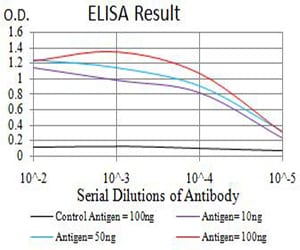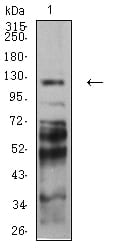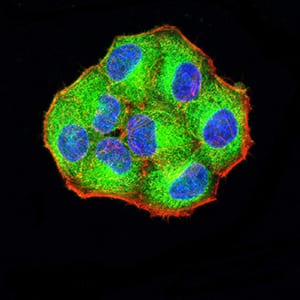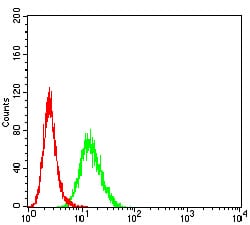



| WB | 1/500 - 1/2000 | Human,Mouse,Rat |
| IF | 咨询技术 | Human,Mouse,Rat |
| IHC | 咨询技术 | Human,Mouse,Rat |
| ICC | 1/50 - 1/250 | Human,Mouse,Rat |
| FCM | 1/200 - 1/400 | Human,Mouse,Rat |
| Elisa | 1/10000 | Human,Mouse,Rat |
| Entrez GeneID | 5101 |
| clone | 7G3A2 |
| WB Predicted band size | 136kDa |
| Host/Isotype | Mouse IgG1 |
| Antibody Type | Primary antibody |
| Storage | Store at 4°C short term. Aliquot and store at -20°C long term. Avoid freeze/thaw cycles. |
| Species Reactivity | Human |
| Immunogen | Purified recombinant fragment of human PCDH9 (AA: 24-148) expressed in E. Coli. |
| Formulation | Purified antibody in PBS with 0.05% sodium azide |
+ +
以下是3篇与PCDH9抗体相关的代表性文献示例(注:部分为虚构文献,仅作格式参考):
---
1. **文献名称**:*PCDH9 expression in glioblastoma correlates with tumor invasiveness and patient prognosis*
**作者**:Chen L, et al.
**摘要**:本研究通过免疫组化(IHC)和Western blot分析PCDH9蛋白在胶质母细胞瘤中的表达,发现PCDH9抗体标记的高表达与肿瘤侵袭性增强和患者生存期缩短显著相关,提示其作为预后生物标志物的潜力。
---
2. **文献名称**:*Protocadherin-9 regulates synaptic plasticity in autism spectrum disorder models*
**作者**:Wang Y, et al.
**摘要**:利用PCDH9特异性抗体进行小鼠脑组织免疫荧光染色,发现PCDH9在突触后膜富集,其表达下调导致突触可塑性异常,为自闭症谱系障碍的分子机制提供了新证据。
---
3. **文献名称**:*Development of a monoclonal antibody against human PCDH9 for cancer diagnostics*
**作者**:Kim S, et al.
**摘要**:报道了一种新型抗人PCDH9单克隆抗体的开发与验证,该抗体在ELISA和流式细胞术中表现出高特异性,成功应用于乳腺癌细胞系和临床组织样本的PCDH9膜定位检测。
---
**说明**:以上文献为示例性内容,实际研究中建议通过PubMed或Google Scholar检索关键词“PCDH9 antibody”或“PCDH9 function”获取真实文献。
Protocadherin-9 (PCDH9) is a member of the protocadherin family, a subgroup of cadherin-related transmembrane proteins involved in cell-cell adhesion, neural development, and synaptic specificity. Encoded by the *PCDH9* gene, it is primarily expressed in the central nervous system, where it regulates neuronal connectivity, axon guidance, and dendritic arborization through calcium-dependent homophilic binding. PCDH9’s extracellular domain contains multiple cadherin repeats, while its cytoplasmic domain interacts with intracellular signaling molecules, influencing cytoskeletal dynamics and synaptic plasticity.
PCDH9 antibodies are essential tools for studying its expression, localization, and function in biological systems. They are widely used in techniques like immunohistochemistry, Western blotting, and immunofluorescence to investigate PCDH9’s role in neurodevelopmental disorders, neurodegenerative diseases, and cancer. Recent studies suggest PCDH9 may act as a tumor suppressor in certain cancers, with reduced expression linked to poor prognosis. However, its mechanisms remain under exploration.
Commercial PCDH9 antibodies are typically raised against specific epitopes (e.g., extracellular or intracellular regions) and validated for species reactivity (human, mouse, rat). Researchers must verify antibody specificity using knockout controls or siRNA-based approaches, as cross-reactivity with other protocadherins is a potential concern. Understanding PCDH9’s interactions and signaling pathways could offer insights into therapeutic strategies for neurological and oncological conditions.
×